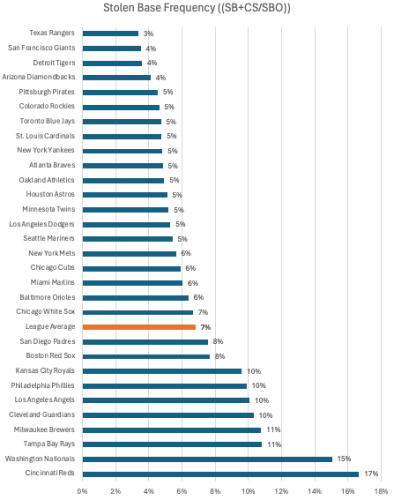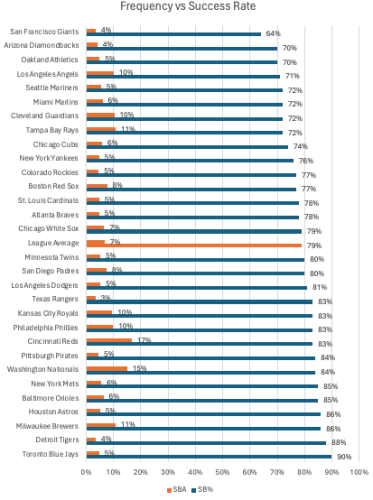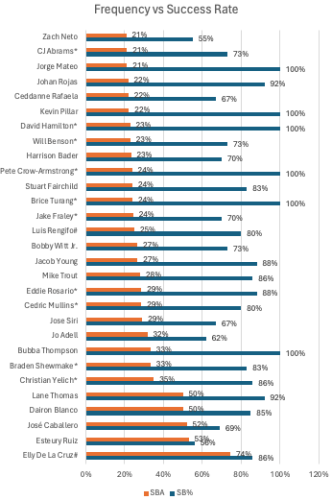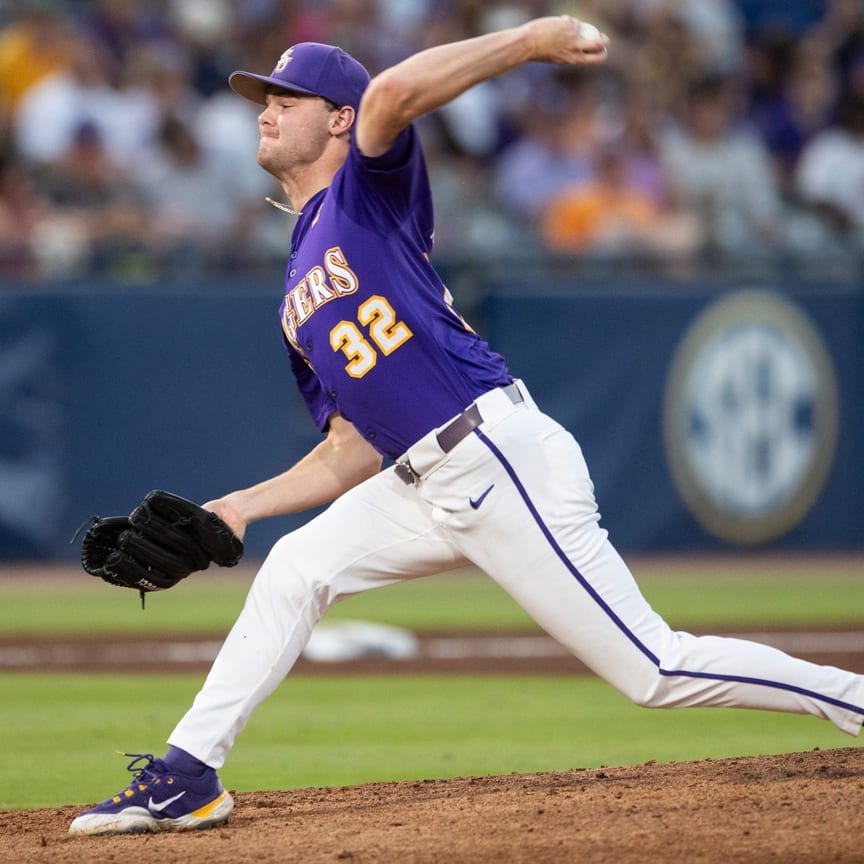We are just a season removed from a level of stolen base production not seen since 1987, yet I firmly believe there are some of you reading this sentence on the hunt for stolen bases. I have the same issue in some of my 11 leagues this year, and it's a topic that frequently comes up as I converse with some of my text groups with other fantasy managers. If steals are so plentiful this season, why are some fantasy managers still hunting for them? My goal in this piece is to help you look for the fertile grounds to scoop up steals and then look for players who are making the most of their opportunities.
It is well recognized at this point that stolen bases is not all about speed. Sprint speed is certainly a factor, but it is not the only factor. Kyle Tucker has nine steals this season yet has a 30th percentile sprint speed. Tucker's nine steals matches those of Julio Rodriguez who possesses a 98th percentile sprint speed. The simple fact is that stolen bases are a mixture of athleticism, the ability to get on base, and managerial tendencies. These parts are not equally weighted, but if we were to weight any one factor more than the other, it would be managerial tendencies. Evan Carter and Wyatt Langford have combined for six stolen bases under Bruce Bochy despite their elite sprint speed and athleticism due to Bochy's conservative management of the running game, but also
We are just a season removed from a level of stolen base production not seen since 1987, yet I firmly believe there are some of you reading this sentence on the hunt for stolen bases. I have the same issue in some of my 11 leagues this year, and it's a topic that frequently comes up as I converse with some of my text groups with other fantasy managers. If steals are so plentiful this season, why are some fantasy managers still hunting for them? My goal in this piece is to help you look for the fertile grounds to scoop up steals and then look for players who are making the most of their opportunities.
It is well recognized at this point that stolen bases is not all about speed. Sprint speed is certainly a factor, but it is not the only factor. Kyle Tucker has nine steals this season yet has a 30th percentile sprint speed. Tucker's nine steals matches those of Julio Rodriguez who possesses a 98th percentile sprint speed. The simple fact is that stolen bases are a mixture of athleticism, the ability to get on base, and managerial tendencies. These parts are not equally weighted, but if we were to weight any one factor more than the other, it would be managerial tendencies. Evan Carter and Wyatt Langford have combined for six stolen bases under Bruce Bochy despite their elite sprint speed and athleticism due to Bochy's conservative management of the running game, but also due to Langford's struggles to consistently reach base.
Bochy is far from the only conservative manager this season. The table below shows how frequently teams are running when the next base is unoccupied, which also takes into account double-steal attempts. Note the league-average is singled out via color and bolded text (for the visually challenged, it is 7 percent):

Note how more than half of the league is below league average in attempt rate, as that rate is being buoyed by two uber-aggressive teams at the high end. If you are looking for opportunities to find stolen bases, it would be best to start with the teams that are actually attempting stolen bases above the league average rate. The average team this season has attempted 46 stolen bases and is successfully converting 79 percent of their opportunities. The breakeven rate for stealing bases has historically been around 74 to 75 percent, so let's add that wrinkle into the data to see what teams are not only running often, but doing so successfully:

Not only are both the Nationals and Reds running more than any other team in baseball, they're also doing it very well, as both teams are converting at least 83% of their stolen base opportunities. Kansas City and Milwaukee, while not running as wild as the Nationals and Reds, are doing even better, converting 83 and 86 percent of their steals, respectively. Conversely, Anaheim, Cleveland and Tampa Bay are running often, but their team success rate is below the break-even point, which puts those clubs at risk of slowing down a bit should the front office grow tired of giving away outs on the bases. There are teams picking their spots for stolen base success such as Toronto, but that club has also once again struggled to generate consistent offense this season as it finds itself in the cellar of the extremely competitive AL East (so much for my preseason World Series pick!) Finally, it's worth noting that the Rangers, when they do run, are successful at an above-average rate, so one has to wonder what could happen if Bochy decides to turn a new leaf and let his athletes attempt steals.
You will recall from last week's article that Elly De La Cruz was leading the league attempting steals 81 percent of the time when the opportunity was there, but that has slipped to 74 percent with his recent slump. That said, he is still well ahead of the league in stolen base attempt frequency. The table below shows all players who are attempting steals three times above the league average (7 percent) and their success rates in those attempts:

Zach Neto's six steals have been fun, as have Jo Adell's eight steals, but they have also been caught five times each, so they are absolutely in danger of losing their chances to run. Neto should learn more from Luis Rengifo, who is making the most of his chances under the same manager, as was Mike Trout before the surprising injury. Conversely, Brice Turang has a license to run as he has yet to be caught and Pat Murphy has him running quite frequently. Jose Caballero leads all full-time American League players in stolen base frequency, but he also leads the league in being caught as well as picked off.
We know which teams like to run a lot and which players have been the most aggressive with those opportunities, but here are some names to consider moving forward:
- Randy Arozarena: Already 7-of-9 stealing bases, and attempting a steal in 18 percent of his chances. If he can ever snap out of the slump he's in and get on base consistently, he could begin to run wild as the club continues to search for consistent offense.
- Jake Bauers: Already 5-for-6 in Milwaukee despite only facing righties and running in 18 percent of his opportunities.
- Jackson Chourio: The rookie has struggled mightily to reach base, but when he's on base, he's in motion, running 15 percent of the time and converting seven of his eight stolen base attempts
- Jack Suwinski: Not exactly the guy you think of when looking for steals, but he is 5-for-5 in steals running 11 percent of the time. (Editor's note: Suwinski was optioned hours after this article was submitted, but keep this stat in mind for when he returns.)
In short, steals are about a combination of skills more so than any one particular skill. Phil Niekro stole a base in his mid forties, and Daniel Vogelbach may someday steal one before his career is over, so anything is possible. While there are examples of stolen base production on conservative teams, you are still better off chasing stolen base success from players on teams with managers who like to utilize the running game. NL-only managers likely had to scoop up Santiago Espinal as the Reds went through a myriad of injuries, and while he has struggled offensively, he has still stolen five bases against a career high of six, which happened in double the playing time in 2021 with Toronto. That is also why I am curious to see what Jacob Hurtubise does with his recent move to the leadoff spot given he swiped 45 bases in the minors last year.






































